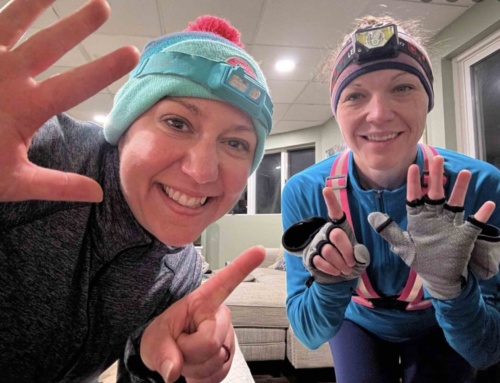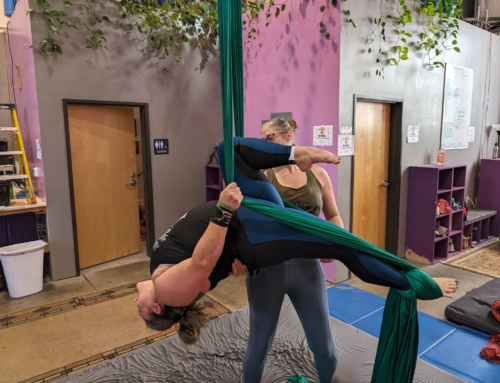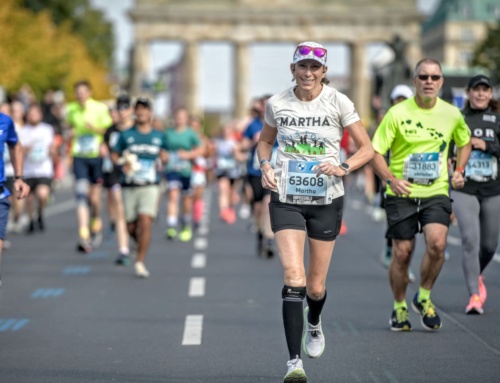Most mother runners know Peter Sagal’s speaking voice. The Wait, Wait … Don’t Tell Me host has been in our ears during countless long runs. If you are not a fan of the NPR quiz show, which seems impossible but I am certain there are a few, you might have heard him on the AMR Father’s Day pod last year.

Peter after a 26.2-mile tour of the Twin Cities in 2013.
While Sagal’s voice is one I could pick out of a line-up, the rest of him an enigma. I knew he was a runner and loved his Runner’s World columns. I knew he’d gone through a divorce and depression and liked Game of Thrones. But other than the barest outlines, most of which were shaped to use jokes to hide any actual human responses, these details didn’t offer any insight into who he was as a person. Sagal kept his public persona on lockdown. “You will only see what I want you to see,” it said. “There will be no accidental slips of vulnerability.”
Which is fine, mind you. People, even famous-in-certain-circles people, get to be who they are. Plus, I deeply understand the appeal of using humor and intellect to keep others at arm’s length.
In The Incomplete Book of Running, Sagal lets us see how running has changed who he is, which means he’s had to pull the curtain back a bit on who he has been. And that, reader, makes all the difference. Rather than this book reading like a self-depreciating but ultimately unsatisfying monologue about the indignities of running, he uses running as a metaphor for becoming who you were always meant to be.
Sagal covers his life’s most tumultuous year, which is bookended by the Boston marathon. His year starts with a bombing, both literal and not, and ends with a potential DNF, also both literal and not. Sagal doesn’t stick to just those 365 days; however, he weaves in and out of his 50+ years to make his points about life and running and how the two are inexorably intertwined.
Granted, this Incomplete book is not all deep, meaning-of-existence stuff. There is running advice, like this bit on how to become a runner: “Get up. Start. Go. Move. Take a rusty first step, like the Tin Man. You will squeak. Go.” There are observations about the lunacy of being a runner, like this bit that I couldn’t help but snicker with after my epic half in a nor-easter in Cape Cod a few weeks ago:
Sagal offers sensible advice about gear and PRs and aging and diet. What you won’t find are grant self-help pronouncements, where Sagal tells us how to be a better person via running. Instead, he offers up very specific moments from his growth as a runner and how they’ve changed him. Runner’s World stories — about his red underpants race, about his explosive colon, about guiding blind marathoners — are smartly expanded. Their specific-ness is what makes them feel universal, too. For example, while I’ve not run red undies down the streets of St. Louis (yet), I can understand the larger message of how running for a cause, rather than for yourself, can change you.
As fun as those essays are, they work foot-in-shoe with what Sagal wants us to know about how running has helped him through some tough life events and into almost-joyful acceptance. To do that, he has to reveal the tough life events in question, which is what moves this Incomplete book from an amusing diversion to an honest reflection that lets us empathize with Sagal’s larger story about falling apart and pulling yourself back together. Again and again and again.
This is a running book that won’t tell you how to run faster or farther or be fitter; instead, Sagal will show you how running can make you into a better human.
With, of course, some jokes to make it all easier to bear.








I attended a Q&A style author event with Sagal last night in Atlanta. I enjoyed all of it, as did my non-running friend who came with. Highly recommended if he comes to your town.
Thanks for the review, Adrienne! I was worried that it would be wisecracks with his usual veneer — which I enjoy, but am not interested in reading for several chapters. Now adding this to my Christmas list!
The timing of this is perfect! I was planning to add Oeter’s book to my Christmas list, but now I may have to buy it for myself before then.
Thanks for this smart review, Adrienne! You’re pretty much the only person I’d trust on this. Like Shawnee P, I was worried it would be all wisecracks and (male, sorry) veneer. He IS funny and smart (he’s a pro–literally). I’m still not sure I’ll go there, but I am grateful that you did and reported back. ;) Happy Thanksgiving to you and yours!
I heard about this book on Paula Poundstone’s podcast and ordered it immediately. Now I’m even more excited to start reading it.
Looking forward to this book! I enjoyed him on the Father’s Day podcast.
Thank you for the review of the book. It will definitely go on my wish list. I love the part about the Cape Cod half. It was wonderful running with all the BAMR’s because if I was running that alone I would have never gotten to the start line. Happy Thanksgiving!
I am intrigued by your review. I don’t normally read “running books” as for me it’s so personal and almost religious the past 47 years I have been running. But if I see it in my bookstore where I have tons of credit, I will give it a try.
I am intrigued- but I normally don’t read running books as running the last 47 years of my 65 I have been on this earth is so personal and almost spiritual I don’t share any “wisdoms” about it with anyone. But if I see it at my bookstore where I have tons of credit, I just may pick it up.
I normally don’t read running books as running has been such a personal and spiritual journey for me the last 47 years that sharing things about one’s running kind of cheapens it somehow. But if I see it in my used bookstore I just may pick it up. Thanks!
I put this on the hold list at my local library as soon as I heard about it. I have a total radio crush on Peter. I’m about halfway through the book and really enjoying it. I think his stories resonate as they are all too familiar – even though I am not a 50 something divorced father of 2 girls, but rather a happily married 40 something mother of two boys. Totally different, yet the same. Trying to hold myself together one run at a time.
Thanks for the recommend! I’m looking forward to reading this book!
Really nice writing in this review! Makes me want to read the book.
Our running group recently started a book club too. (Which makes me love my running group even more!) I will definitely be putting this on the list for one of our next books. Thanks for the review!